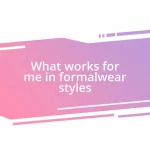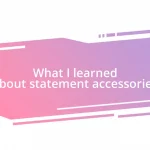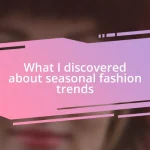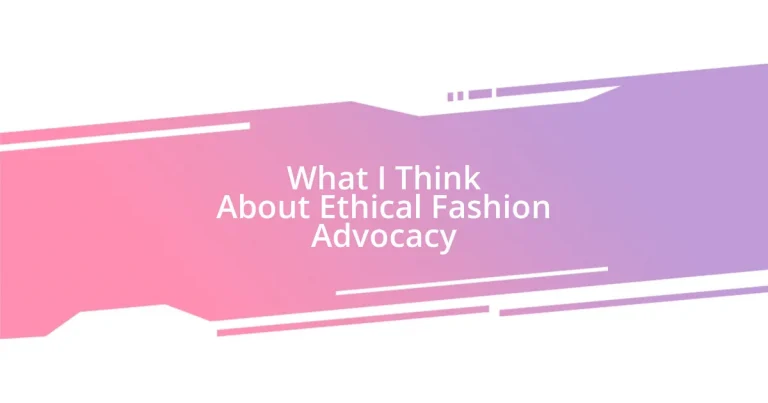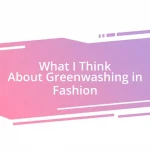Key takeaways:
- Ethical fashion advocacy emphasizes the importance of understanding the impact of clothing choices on people and the planet, promoting sustainability and fairness.
- Key principles of ethical fashion include fair labor practices, sustainable materials, transparency, community support, and timeless design, fostering a sense of responsibility in consumers.
- Challenges in ethical fashion involve higher prices, the complexity of certification, and emotional responses to fast fashion’s realities; however, informed consumer choices can drive positive change.
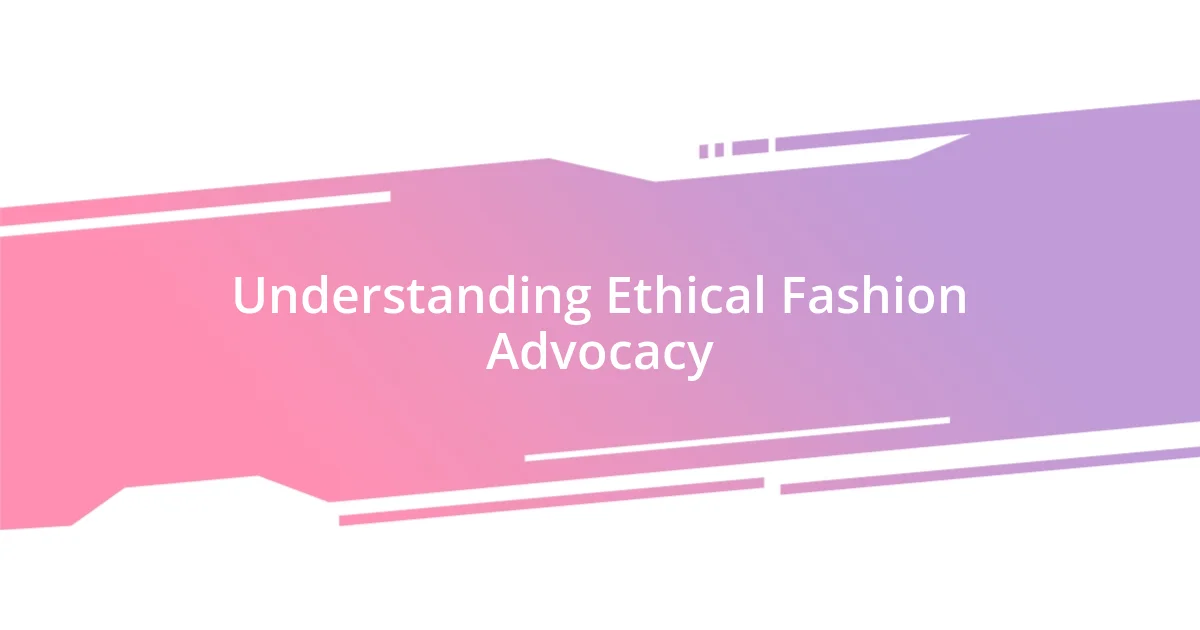
Understanding Ethical Fashion Advocacy
Ethical fashion advocacy is a movement aimed at transforming the way we think about clothing production. For me, it’s about understanding the impact our choices have on people and the planet. I often find myself questioning, “What story does my wardrobe tell?” When I delve into the origins of my clothing, I realize it’s not just about style; it reflects values of sustainability and fairness.
I remember the first time I learned about the harsh realities behind fast fashion. I was shocked to discover that many garments are produced in conditions that exploit workers and harm the environment. That eye-opening moment ignited my passion for advocating for brands that prioritize ethical practices. It made me more mindful of where I shop and the stories I support.
Exploring ethical fashion has truly been an emotional journey for me. It’s not just about choosing sustainable fabrics or supporting fair wages; it’s about fostering a sense of responsibility. Every time I make a conscious choice, I feel empowered. I often ask myself, “How can I contribute to a better future through what I wear?” It’s a question worth pondering, as each choice can lead to broader changes in the fashion industry.
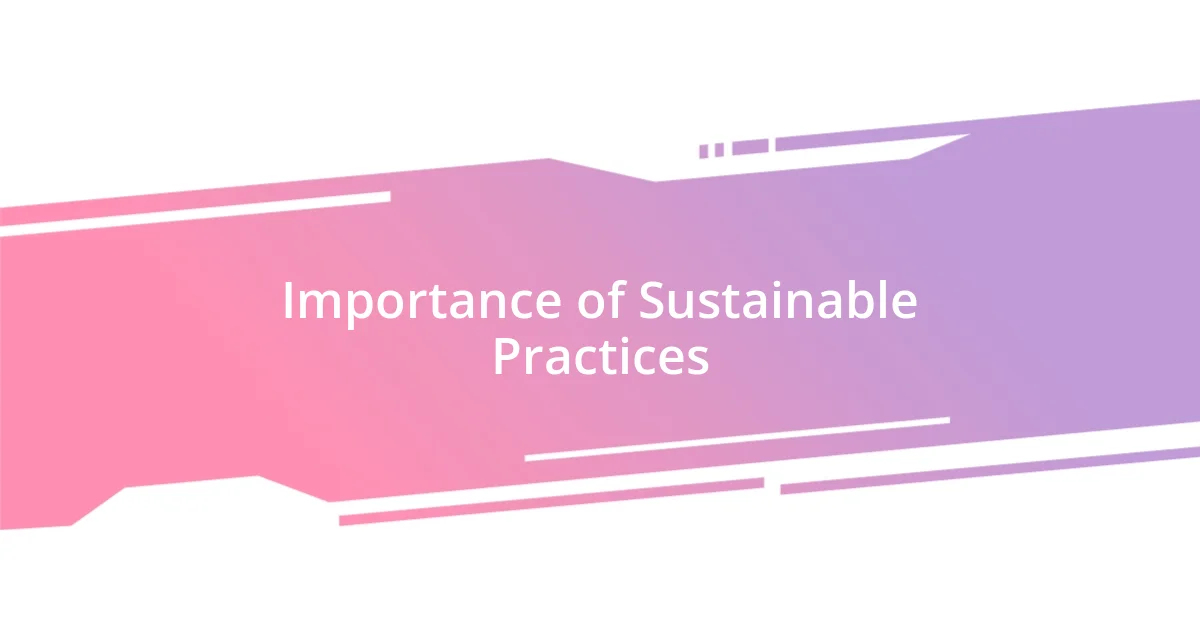
Importance of Sustainable Practices
The significance of sustainable practices in fashion cannot be overstated. I recall my visit to a local artisan market where I met a designer who sourced materials from within her community. She spoke passionately about reducing waste and supporting local economies, and it inspired me to appreciate how mindful production can uplift entire communities while protecting our planet. It made me realize that every garment carries a story, and choosing sustainable practices means selecting narratives that promote wellbeing and sustainability.
Further, I’ve learned that sustainable practices extend beyond just using eco-friendly materials. For instance, I once attended a workshop focused on upcycling clothing. The thrill of transforming an old piece into something new was exhilarating! It highlighted how sustainable fashion encourages creativity and reduces the constant demand for new resources. This proactive approach not only helps in minimizing waste but also fosters a deeper, more personal connection to our clothing.
By implementing sustainable practices, we also encourage transparency in the fashion industry. When brands disclose their production processes and ethical standards, it builds trust. I vividly remember when I found my favorite shirt from a brand that openly shared its fair-trade sourcing. This transparency reassured me that my purchase was aligned with my values, reinforcing my belief that fashion can be both stylish and conscientious.
| Sustainable Practices | Fast Fashion |
|---|---|
| Promotes eco-friendly materials | Often uses harmful materials |
| Supports local economies | Contributes to exploitation |
| Encourages upcycling and creativity | Focuses on mass production |
| Builds brand transparency and trust | Lacks accountability |
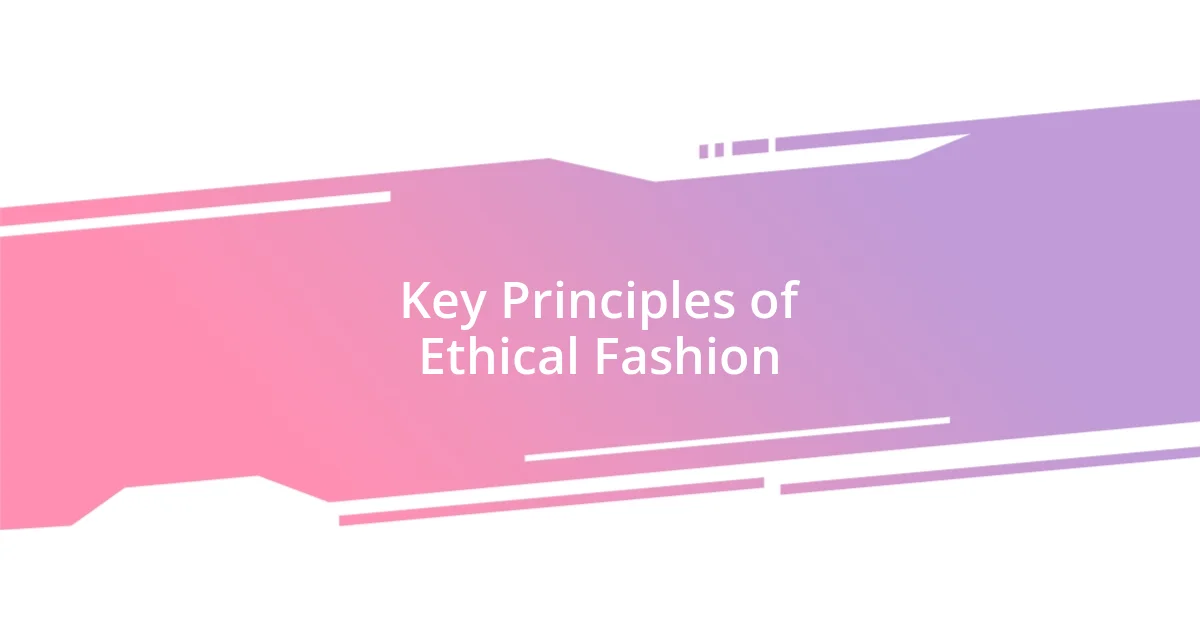
Key Principles of Ethical Fashion
The key principles of ethical fashion revolve around compassion, responsibility, and transparency. I can’t help but think about the time I came across a small label that openly details its entire supply chain. It felt like discovering a rare gem! I appreciated knowing where my clothes came from and the hands that made them. This level of transparency not only fosters trust but also aligns with my values. It reminds me that ethical fashion is not just about making choices; it’s about understanding the implications of those choices.
Here are some fundamental principles to consider in ethical fashion:
- Fair Labor Practices: Ensuring that all workers receive fair wages and work in safe conditions.
- Sustainable Materials: Using eco-friendly fabrics that reduce harm to the environment.
- Transparency: Brands should disclose their sourcing and production practices to build trust with consumers.
- Community Support: Fostering local economies by sourcing materials and labor from within the community.
- Timeless Design: Promoting styles that transcend trends, encouraging consumers to invest in quality over quantity.
Every time I choose to support a brand that aligns with these principles, I feel a sense of connection. It’s more than a purchase; it’s a statement about the kind of world I want to live in. I remember holding a beautifully crafted piece made of organic cotton and thinking about the artisans who took the time to create it. It’s those moments that spark joy and reinforce my commitment to ethical fashion advocacy.
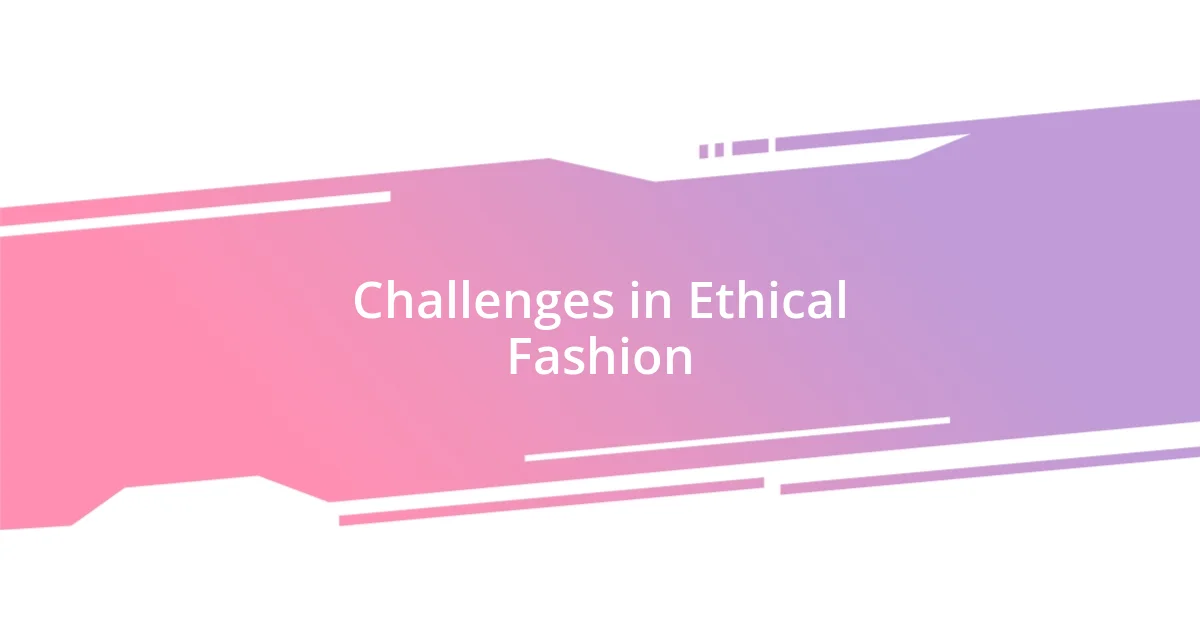
Challenges in Ethical Fashion
Navigating the world of ethical fashion is not without its hurdles. One challenge I often encounter is the higher price point of ethical brands. Many people question, “Why should I pay more when fast fashion is so cheap?” I’ve felt that pinch in my own wallet. However, investing in ethically made clothing means I’m supporting workers who earn fair wages, and that’s something I can feel good about. It’s a conscious decision to uplift communities, even if it takes a little more financial commitment.
Another obstacle lies in the vast array of certifications and claims brands make about their sustainability and ethics. It can feel overwhelming to discern what’s genuinely ethical versus just a marketing gimmick. I still remember the confusion I felt when shopping for a pair of shoes that were advertised as “eco-friendly.” After some digging, I realized that not all eco-friendly labels carry the same weight. This experience taught me that being an informed consumer requires research and an understanding of what authentic ethical practices entail.
Lastly, there’s the emotional toll of confronting the harsh realities behind the fashion industry. Sometimes, I find myself grappling with guilt after learning about the exploitative labor practices in fast fashion. I wonder—can my daily choices really make a difference? This journey has made me recognize that every small step counts. When I choose to advocate for ethical fashion, I’m not just changing my wardrobe; I’m contributing to a broader movement towards a kinder, more sustainable world. That realization gives me hope.
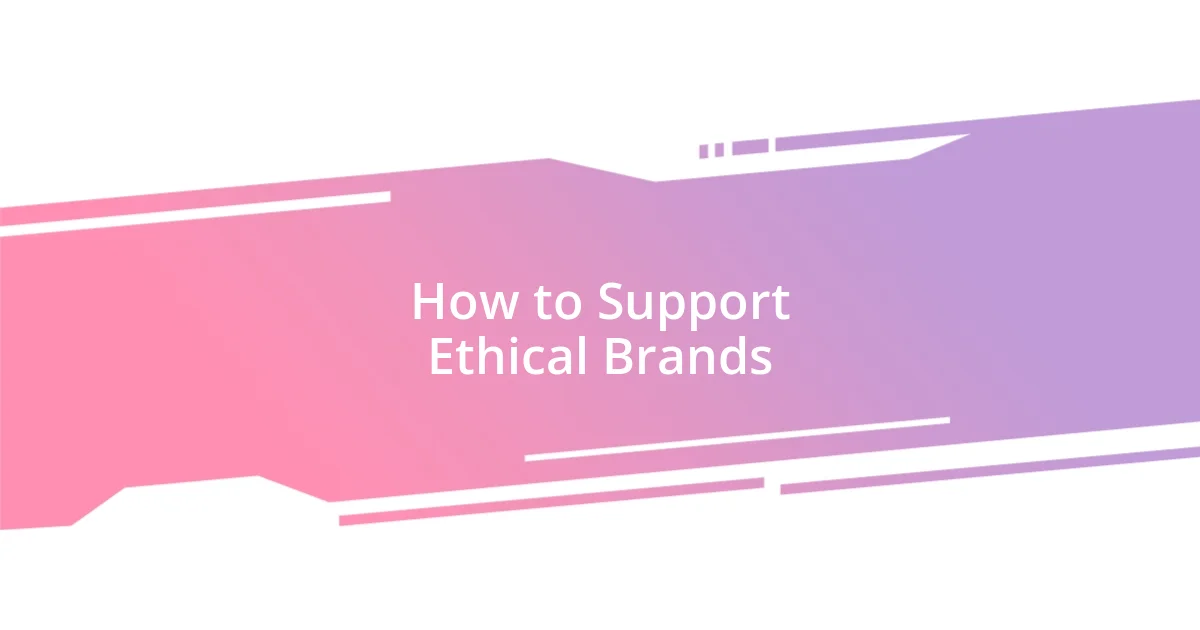
How to Support Ethical Brands
Supporting ethical brands isn’t just about purchasing clothing; it’s about being intentional in your choices. I recall a time when I opted for a local boutique that partnered with artisans from my community. The thrill of knowing my shirt was handmade, supporting talented individuals nearby, added so much more value to my shopping experience. Have you ever felt that rush when you buy something meaningful? It’s a wonderful reminder that our purchases can empower others.
I often find myself scrutinizing labels and doing a bit of homework before hitting “checkout.” One instance that stands out was when I discovered a brand that not only utilized sustainable materials but also donated a percentage of profits to environmental causes. I remember feeling a wave of satisfaction knowing my money was fostering positive change. I think it’s essential for all of us to ask how our financial choices align with our values. What impact do we truly want our purchases to have?
Furthermore, engaging with ethical brands goes beyond buying—it’s about spreading the word. I’ve enjoyed discussing my favorite ethical labels with friends and family, helping them understand the importance of their fashion choices. Conversations often spark curiosity, leading others to join the movement towards responsible shopping. Have you thought about how your advocacy can inspire those around you? Sharing insights and experiences can amplify our collective impact on supporting ethical brands.
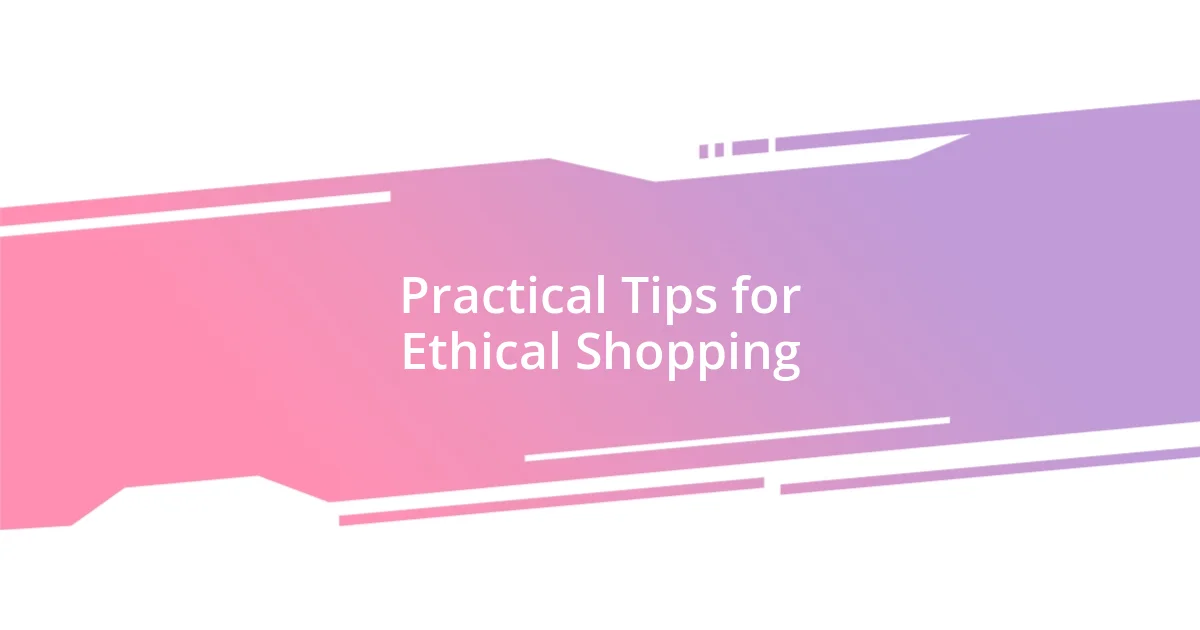
Practical Tips for Ethical Shopping
When it comes to ethical shopping, I’ve found that being mindful about where my clothing comes from makes a significant difference. For instance, I once stumbled upon a brand that sourced its materials from recycled fabrics. The moment I pulled on that jacket, I felt connected to something larger—a mission to reduce waste. It’s amazing how a simple choice can turn an everyday item into a statement of values. Have you ever experienced that link between your purchase and a cause?
Another practical tip is to embrace the power of second-hand shopping. I recall the thrill of finding vintage pieces at a local thrift shop, each with its unique story. Not only does buying second-hand promote sustainability, it can also uncover some hidden gems that express my personal style in ways mass-produced clothing never could. It’s thrilling to realize that every time I opt for pre-loved fashion, I’m reducing demand for new production. Isn’t it exhilarating to think about the treasures waiting for us in second-hand stores?
Lastly, I always find it beneficial to take a moment to ask myself—do I really need this item? By assessing my shopping habits, I’ve cut down on impulse buys. This reflection not only saves me money but also curbs the tendency to contribute to fast fashion’s cycle. I often remind myself that it’s perfectly okay to walk away from a pretty dress if it doesn’t serve a purpose in my wardrobe. Have you ever paused to consider the impact of a quick purchase? It’s in those small moments of mindfulness that I’ve forged a deeper connection to ethical fashion.


